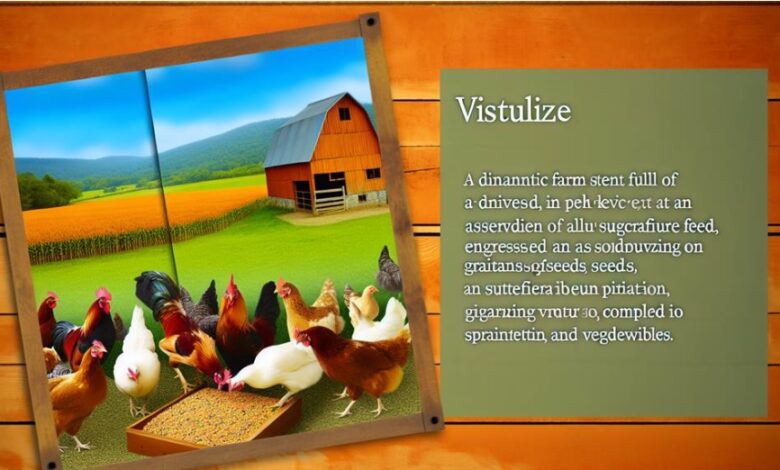Best Chicken Feed Options for Healthy Poultry

When it comes to maintaining the health of your poultry, understanding the various feed options available at each stage of their life is crucial. You might wonder why starter feed is essential for chicks or how grower feed can prevent health issues in pullets. And what about layer feed for hens? Does the balance of calcium and protein really make a difference in egg production? Additionally, the decision between organic and conventional feed, and whether to choose medicated or non-medicated options, can be overwhelming. Let’s explore these choices, and see how you can provide the best nutrition for your flock.
Starter Feed for Chicks
When you’re beginning to raise chicks, selecting the right starter feed is crucial for their growth and development. Starter feed must meet the specific nutritional requirements of young chicks, typically containing 20-24% protein to support rapid growth. Ensure the chicken feed is fortified with essential vitamins and minerals like vitamin A, D3, and niacin.
Establishing a consistent feeding schedule is equally important. Offer feed multiple times a day to ensure they’re getting the nutrients they need consistently.
Fresh, clean water should always be available, as hydration is critical for nutrient absorption. By closely monitoring their diet and maintaining a regular feeding routine, you’ll set a strong foundation for their future health and productivity.
Grower Feed for Pullets
Transitioning your poultry from starter feed to grower feed is a critical step in their development. At this stage, pullets require a balanced diet to support their growth. Grower feed typically contains 16-18% protein, meeting their protein requirements without the excess found in starter feed. This adjustment helps prevent issues like fatty liver disease and promotes optimal muscle and feather development.
In addition to protein, grower feed should include essential nutritional supplements like vitamins, minerals, and amino acids. These supplements ensure pullets build strong bones and a robust immune system.
Always monitor their growth and health, making adjustments as needed. Providing a well-rounded grower feed will prepare your pullets for the next stage of their life cycle.
Layer Feed for Hens
Layer feed is a specially formulated diet designed to meet the nutritional needs of egg-laying hens. It provides essential nutrients like calcium, protein, and vitamins necessary for optimal egg production and overall health. Ensuring your hens receive the correct nutritional requirements is crucial for strong eggshells and consistent laying patterns.
Typically, layer feed contains around 16-18% protein and at least 3.5% calcium.
To maximize benefits, follow a consistent feeding schedule: provide fresh feed daily and ensure clean water is always available. Avoid overfeeding by offering the appropriate amount based on the number of hens.
A well-balanced layer feed supports your hens’ health and productivity, ultimately leading to a more successful poultry-keeping experience.
Organic Feed Options
In addition to conventional feeds, organic feed options offer a natural and sustainable alternative for those prioritizing the health of their poultry and the environment. Organic feeds are free from synthetic pesticides, fertilizers, and GMOs, ensuring the nutritional benefits of cleaner, chemical-free ingredients. Studies indicate that organically-fed chickens often exhibit improved immune function and better overall health.
Although the cost comparison between organic and conventional feed shows that organic options are generally more expensive, the long-term benefits can outweigh initial costs through enhanced poultry well-being and potentially higher egg quality. By choosing organic feed, you’re investing in the welfare of your flock and contributing to more sustainable farming practices.
Medicated vs. Non-Medicated Feed
While organic feed options provide a natural and sustainable choice for your poultry, understanding the differences between medicated and non-medicated feed is also critical for their health.
Medicated feed typically contains coccidiostats, which help prevent coccidiosis, a common parasitic infection. This can mitigate health risks associated with outbreaks, particularly in young chicks. However, reliance on medicated feed should align with regulatory guidelines to avoid antibiotic resistance and ensure food safety.
Non-medicated feed, on the other hand, is free from these additives and suitable for flocks not exposed to such risks or those raised organically. Always assess your flock’s specific needs and consult veterinary advice to make informed decisions, balancing health benefits and potential risks.
Homemade Feed Recipes
Creating homemade feed recipes for your poultry can offer greater control over their nutritional intake and ensure the ingredients are of the highest quality. To achieve optimal nutritional balance, include a variety of grains like corn, wheat, and barley, combined with protein sources such as soybean meal or fish meal.
Adding calcium supplements like crushed oyster shells supports egg production. Homemade feed can also be cost-effective, especially if you buy ingredients in bulk or grow some yourself. Always ensure that the feed meets your poultry’s specific dietary needs by consulting nutritional guidelines or a poultry nutritionist.
Monitor your flock’s health and productivity to make necessary adjustments, ensuring the feed remains both nutritious and economical.
Conclusion
To ensure your poultry thrives, it’s crucial to choose the right feed at each life stage. While starter feed provides high protein for chicks, grower feed supports pullets’ development, and layer feed ensures strong eggshells and consistent laying. Organic feed promotes sustainability, whereas medicated feed addresses specific health needs. You might opt for cost-effective homemade recipes, balancing nutrition and budget. By making informed, evidence-based choices, you’ll foster a healthy, productive flock.




